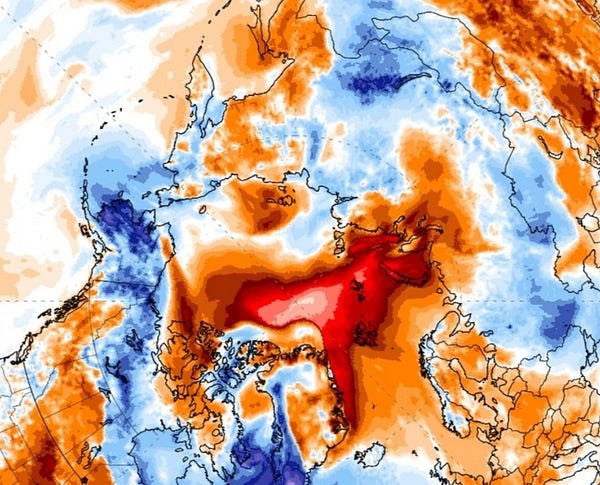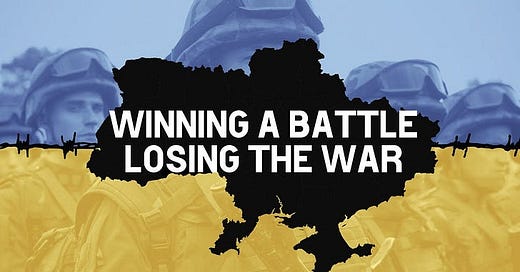This is a special (and shorter) edition. To be honest it’s been so delayed mainly because news flow has been insane so I’ve had several failed drafts that felt out of date before I could send them - and things have now reached something of a temporary respite compared to the early stages of the invasion.
Normal service to resume next week (hopefully).
🌏 Climate change & biodiversity destruction
Only one thing to know this week:
Heatwaves at both of Earth’s poles alarm climate scientists


🇺🇦 News list - Ukraine
In Newsletter 57 (November 15), Newsletter 58 (November 22), Newsletter 60 (December 13), Newsletter 63 (January 21), Newsletter 64 (January 31), Newsletter 65 (February 13) and the last one, Newsletter 66 (February 20), the signals of a Russia/Ukraine conflict were mentioned explicitly, or Russia-related incidents were highlighted.
On January 31 I started working in earnest on improving a Twitter list I had already created to identify as many reliable sources in Ukraine as possible, while continuing to watch the Russian troop buildup via open sources who were cataloguing and identifying the vast amounts of equipment being deployed around Ukraine’s border. I linked to it in Newsletter 64. And back in Newsletter 58 in November I noted:
Of course it’s not just China. Russia is massing troops on the Ukrainian border. Something to eh, keep an eye on, this winter. (5 mins by Alberto Nardelli and Jennifer Jacobs)
By the time Newsletter 66 came around on February 20 I had concluded an invasion was almost certain, on all fronts - and linked to a video outlining the likely invasion plans based on US intelligence reports (which turned out to be more or less accurate).
Since then that Twitter list has gone from a few dozen followers to 25,000, the followers of which have a combined following of ~30,000,000 people. No small responsibility - and another reason for this newsletter being delayed. My apologies to everyone.
Why do I mention these past editions? Well part of the focus of this newsletter is pattern recognition, systems thinking and understanding potential upcoming events. And part of that is assessing how right (or wrong) one can be about those events.
On February 24, 2022 something akin to an earthquake happened. It’s a bit like as of right now the world is wandering a beach, awaiting an enormous tsunami. We do not yet fully know yet the full implications of the earthquake way out at sea, but we do know something happened. Whether the world makes it to higher ground before the tsunami arrives is still in question. And it’s important to think about time here: it’s all happening very fast and in slow motion at the same time. Events will play out over months and years related to this war - and we will all face the consequences.
Back in early 2017 I wrote an essay after the election of Donald Trump, titled “The next 40 years, not the next four”. In it I argued that the election of Trump was a milestone in global geopolitical events, and that the world would be defined by the lurching towards authoritarianism over the coming decades. I framed the piece in three places had visited in 2008 and 2009 - Georgia, the United States and Syria - two of which were places of Russian invasion or intervention. My conclusion in early 2017 was:
This time is different. Within a very short period of time we will find ourselves in a completely different world, one that none of us is ready for nor indeed for which we have any frame of reference. And there will be few people still alive who have that frame of reference to teach us.
In a new world order of authoritarianism, we will need to learn fast.
This remains the case. The Putin/Xi axis continues to change the geopolitical order - and the likelihood of Chinese invasion of Taiwan this side of 2030 has increased substantially.
The other clear risk: the use of nuclear weapons. Given the events of the past month I would say the chances of a Russian use of a tactical low yield (1kt - 10kt) nuclear weapon in (ie “tailored damage”, non-strategic weapon) to be above 50%. Use of tactical nuclear weapons is part of Russian military doctrine. Is Putin going to use one on Kyiv to shorten the war (from his perspective)? Who knows. But it’s become a scenario to be considered.
For more see: This Is a Uniquely Perilous Moment
I think it’s important to step back and cast your mind forward to 2025, 2030, 2040. What are the likely consequences of events playing out now? In my mind, they are very few positive scenarios - ie ones where the world becomes more peaceful than it is now. Rather it seems more likely that conflict spreads over the coming years. We can’t predict when and how, but we can look at balances of probabilities. In future editions we will look at some of those potential scenarios.
Russia / Ukraine reading list
This is some of the best reading over the past few weeks:
Feeding the bear - a closer look at Russian Army logistics (November 2021)
Why no mass protests in Russia? (February 2022)
Defending the city: an overview of defensive tactics from the modern history of warfare (February 2022)
A Scholar of Stalin Discusses Putin, Russia, Ukraine, and the West
Signal and noise: What Russia’s nuclear threat means for Europe
How Far Is the Russian President Willing To Go?
Putin’s invasion of Ukraine marks the beginning of a post-American era
The Intellectual Catastrophe of Vladimir Putin's Philosophy of Nationalism
Is the Russian Air Force Actually Incapable of Complex Air Operations?
This is how journalists figure out if all those Ukraine videos are real
What the Russian Invasion Has Done to Ukraine
A risk-averse Germany enters an age of confrontation (€)
Ukraine Will Get Switchblade Suicide Drones As Part Of New U.S. Aid Package Lawmaker Says
This thread:

An analysis of failed logistics (20 mins)
This to me is a cogent analysis of why Putin has miscalculated: (13 mins)
Task and Purpose consistently argues against biasing your view of the conflict through the lens of what you see the most - but try to understand what may amount to simple Russian military doctrine being perceived as losses on their side, rather than the many weeks, months or years yet to come. I disagree with some of his media commentary - but the points about biased views of Ukrainian successes because their content is more accessible generally are well made.
NYT on foreign fighters in Ukraine (6 mins):
What do the markings mean? A really good and detailed explanation. (5 mins)
Podcast(s)
(The best stuff I’ve listened to, or been recommended by subscribers)
It’s all Russia Ukraine - and mostly Ezra Klein who has been on something of a roll with the quality of guest and discussion since the conflict started. I recommend all of these but in particular Fiona Hill and Emma Ashford.
Ezra Klein talks to Fareed Zakaria about the new geopolitical order. (65 mins) They argue that one era ended and another began last month, but I would trace it back further (as I did in 2017) - just from an American perspective it was harder to see. Otherwise an interesting conversation on the fundamentals. (66 mins)
Ezra Klein spoke to Fiona Hill. (58 mins)
Ezra Klein and Masha Gessen. (61 mins)
Ezra Klein spoke to Timothy Snyder (72 mins)
Ezra Klein spoke to Emma Ashford on Realist views of the war. (74 mins)
Into the Third Week: Will Russian Forces Need to Pause? (30 mins)
Still in my tabs
(Or stuff I haven’t read yet, but looks promising)
Nothing this week!


